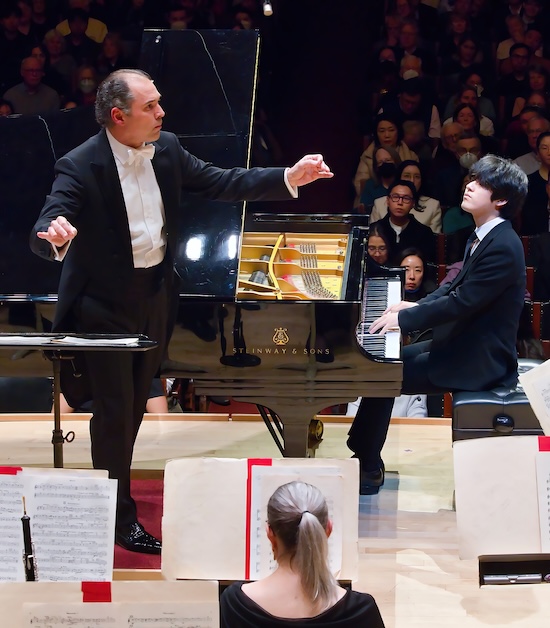Pianist Lim makes an auspicious BSO debut with Rachmaninoff

Yunchan Lim performed Rachmaninoff’s Piano Concerto No. 3 with Tugan Sokhiev conducting the Boston Symphony Orchestra Thursday night. Photo: Hilary Scott
“My father would not let me take up the piano,” Hector Berlioz wrote in his Memoirs. “Otherwise, I should no doubt have turned into a formidable pianist in the company of forty thousand others.”
Berlioz was no doubt exaggerating, but, even today, there is no shortage of brilliantly talented young keyboardists. Not all of them live up to their own hype, of course, and fewer still build and persevere to have long, iconic careers.
But there are more than a few reasons to expect great things from Yunchan Lim, the 19-year-old phenom who, in 2022, became the youngest winner of the Van Cliburn International Piano Competition. On Thursday, Lim performed Sergei Rachmaninoff’s Piano Concerto No. 3 with the Boston Symphony Orchestra and Tugan Sokhiev in an auspicious BSO debut.
The pianist, who is currently a student at New England Conservatory, quickly demonstrated a musical instinct that went far beyond the mere technical aspects of this knuckle-busting favorite. To be sure, Lim had all its notes in hand—easily, in fact, to judge from the casual-looking way he tossed off the cascading runs and cadenzas (including the extended ossia one in the first movement).
Yet even the busiest thickets never seemed to want for purpose or direction. Rather, the musical line, especially when it was enshrouded in virtuosic filigree, emerged with commanding shape.
This was true across Lim’s interpretation. The clarity and logic of his playing over the first part of the Allegro was bracing. But sparks really started to fly in the last two movements.
During the Intermezzo, the pianist’s fervent realization of the music took on a life entirely its own; when that happened, the BSO and Sokhiev were thrillingly along for the ride. A similar electricity coursed through the finale, whose biting articulations were matched by lyricism of expansive warmth and soulfulness.
Throughout his performance, Lim also demonstrated astonishing control over his instrument’s projection. It rang, richly and with pealing resonance, to the far corners of the hall in the concerto’s bold moments, the solo line always carrying over the orchestra. Meantime, the many inward spots, ever clean, balanced, and poetic, held Thursday’s capacity crowd spellbound.
For his part, Sokhiev led the BSO in an accompaniment that was sumptuous if slightly soupy. At a couple of junctures, the strings’ tone sounded raw and some woodwind entrances weren’t secure. But the ensemble’s rapport with Lim was evident in their rhythmically responsive playing as well as the night’s consistently warm blend and good balances with the soloist.
It also emerged in the hearty (and relatively rare) applause the pianist got from his colleagues onstage afterwards—this in addition to the obligatory standing ovation from Thursday’s house. All hands were rewarded with a burnished encore of Frédéric Chopin’s arrangement of “Casta diva” from Bellini’s Norma.
The rest of the night belonged to the BSO and Ernest Chausson’s Symphony in B-flat.
To call Chausson’s 1889 effort a gloss on his friend César Franck’s Symphony is to oversimplify things. However, in essentials, the two works share more than a few traits. Both adhere to a three-movement form, employ the technique of thematic transformation, and rely on a vivid play of orchestral colors for good effect. Also both have fallen off considerably in popularity over the last half-century.
In fact, Thursday marked just the second time the BSO had played Chausson’s score since 1962 (the most recent was in 1993). While the night’s performance didn’t reveal a long-lost masterpiece, it did showcase a work of quirky appeal and enchanting, slightly offbeat lyrical sensibilities.
Sokhiev drew strongly shaped and broadly characterful playing from his forces. The BSO reveled in the first movement’s swashbuckling energy. The central Très lent, with its near-obsessive repetition of a few small cells and radiant instrumental combinations, built to a stormy apex.
Though Chausson’s phrasings in the finale are choppy (and the trumpet solos in the coda were a couple notches above the score’s written dynamic indications), there was plenty of atmosphere to be heard in the movement’s delicate central episode. What’s more, its big, songful tune, with its seeming anticipation of Rachmaninoff, provided a welcome, unexpected tie-in to the evening’s other half.
The program will be repeated 1:30 p.m. Friday, 8 p.m. Saturday, and 2 p.m. Sunday at Symphony Hall. bso.org
Posted in Performances